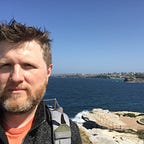It’s a hard thing, getting back to the life you never really had
I thought, for my wife’s birthday, it would be nice to get her some flowers. I suppose that’s not too bold a move, but this thought came to me more than a year into this pandemic or lockdown or whatever you would call it.
I barely leave the house because of the pandemic, so the flower shop — all shops, really — has been right out. But case counts were low at that point and I had one shot of vaccine in me, so I was feeling a bit brave. And it was my wife’s birthday.
I wouldn’t say the florist knows me all that well, but I’m probably her only customer with an American accent here in this corner of eastern Berlin, so I stand out. We chit-chatted and picked out flowers and she asked me how old my kids were now. I answered they were 13 and 11.
“So big?” she said, like I was asking her to comprehend complicated math, not my children’s ages.
And then I remembered. Emma had never been with me to this flower shop and Noah doesn’t go into flower shops because they “stink.” She was remembering Colin. Colin would have been about four the last time she saw him, in 2018 or so. But Colin died in 2019, when he was five. Two years later, she was expecting me to tell her about my seven-year-old, instead I got to tell her about burying him.
I imagine when the average person thinks about re-emergence, given what we’re all going through, thoughts turn to getting to the movies again, or to the gym. Simple stuff like that. And I guess that’s what re-emergence is all about. I think, with me, what makes it different that I was already trying to emerge from under my son’s death when we all got sent home and told to come back out when things were safe.
We’d already spent a year with an autumn when we couldn’t figure out why he was fainting and then a winter of him in therapy and a spring of trying to figure out care for him and then a summer in which we watched him die, re-emerging into the world after he died in September 2019 . It seemed a bit unfair, six months later, to be told to go back home. Just as we were getting the hang of living again.
And it leaves me in places like this flower shop, wondering how do I answer the question “How many children do you have?” How do I explain that, when I see the other 7-year-olds in the street, I’m not struck by how cute they are, but struggle with the question of why they’re not dead instead of my son. Meeting a new person feels like a minefield. Do I depress them at the start by telling about my dead child, or do I lull them into a sense of normalcy and then spring it on them some day? How do I tell people complaining about their health that I find it hard to care, seeing as they got to make it to adulthood, unlike my son.
I kind of feel like I’m lying to everyone, all the time. But if I don’t lie — or at least blur the edge of the truth — I’m never going to make it back into human society. So I twist and turn, telling some people the hard truth and others that things are just “fine.” I see other people who knew him well moving on with their lives, and hate them a little, but then find myself jealous that they seem to be functioning. Then again, I’m pretty sure other people think the same of me.
The florist took the news better than most. She gasped a little and said how hard it must be to watch a part of yourself die, which was more forward than I might have liked her to be, but was a more honest assessment of the situation than a lot of other people have ever given. And then I bought an assortment of white roses, thanked her and told her I’d see her next time, emerging back into the not-quite-a-summer we were experiencing in Berlin that day.
I suppose there should be a point to this, but I doubt I’m the right person to offer life’s truths. I think, whatever you’re re-emerging from — whether it’s a simple lockdown or the death of a loved one or a belief that the coronavirus isn’t real or a biosphere where you got locked away for six months in the name of science — it takes a little time. I think it takes a little practice to find your rhythm.
Then again, one could say the same about any part of life. You do it wrong a lot of times before you get it right. I, at least, get a bit of a freebie — “Oh, he lost his son” — people don’t expect me to get it right the first time. Not everyone else has that luxury, though it’s a hell of a luxury to have been granted.
So, I take it day by day — I think that’s all anyone can do. You learn which people will listen and which people you need to cut loose. You learn whether you’re the kind of person who likes going to the cemetery or would rather just write about him. You learn which TV shows to avoid and which songs you really never need to hear again. You try to see what space there still is for you in society. And isn’t that just what we do every day anyways?
